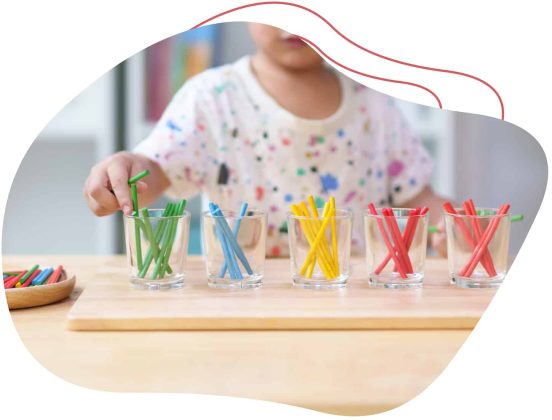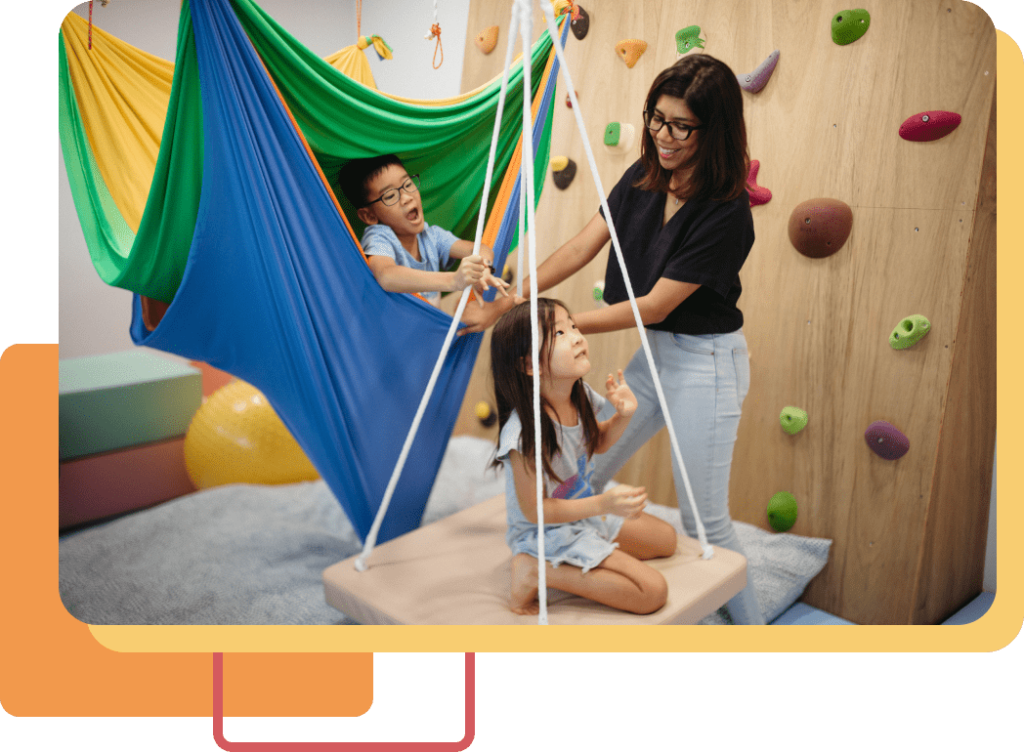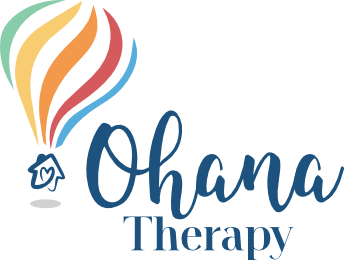Our Services
Occupational Therapy
Occupational Therapy involves the assessment, management, and intervention to develop, recover, or maintain meaningful activities in one’s everyday life or occupation. Simply put, our Occupational Therapists (OTs) work with individuals to ensure they are living their lives to the fullest! Some common areas that our OTs support with include:

- Gross motor skills (e.g. sitting, balancing, walking, climbing stairs)
- Fine motor skills (e.g. grabbing, drawing, writing, typing, using scissors)
- Oral motor and feeding skills (e.g. chewing, swallowing, drinking)
- Sensory processing and modulation
- Self-regulation
- Self-care skills
- Play and social skills
- Executive function
- Visual-perception and visual-motor skills
- Motor planning and coordination difficulties
- Attention and behavioural challenges
- Gross motor skills (e.g. sitting, balancing, walking, climbing stairs)
- Fine motor skills (e.g. grabbing, drawing, writing, typing, using scissors)
- Oral motor and feeding skills (e.g. chewing, swallowing, drinking)
- Sensory processing and modulation
- Self-regulation
- Self-care skills
- Play and social skills
- Executive function
- Visual-perception and visual-motor skills
- Motor planning and coordination difficulties
- Attention and behavioural challenges

Our team has extensive experience working with individuals with a range of diagnoses such as:
- Attention Deficit Hyperactivity Disorder (ADHD)
- Autism Spectrum Disorder (ASD)
- Cerebral Palsy
- Dyslexia
- Dyspraxia
- Global Developmental Delay (GDD)
- Neurological conditions
- Sensory Processing Disorder (SPD)
- Stroke
- Traumatic Brain Injuries
Occupational Therapy
For Children and Teenagers
Occupational therapy involves supporting children in their everyday activities whether it be at home, at school, at the shops or at the playground. We help children independently perform age-appropriate tasks, by helping them with strategies that build on their strengths. Maximising a child’s interaction with the world lays a solid foundation for their future growth and development.
The following are some common signs and symptoms that your child may benefit from occupational therapy:

- Developmental delays
- Impulsive behaviour and reduced self-control
- Handwriting difficulties
- Difficulties identifying letters or letter reversals while writing
- Difficulties copying figures
- Frequent falling when walking
- Prolonged tantrums and difficulties calming down independently
- Poor attention
- Behavioural challenges
- Difficulties in sensory processing (e.g. strong preference for or against certain types of textures in food, hypersensitivity to loud noises)
- Difficulties with sitting upright and general positioning
- Unable to independently feed, shower, or dress self
- Rigidity in the way certain things are done (e.g. presentation of food, way of playing, organisation of items)

At Ohana Therapy, intervention plans and goals are tailored according to each child’s motor, sensory, cognitive and psychosocial needs, which are considered in the context of the child’s family and environmental circumstances. Once OTs complete their assessment, they will be able to give parents valuable insights into the underlying reasons why their child may be responding differently to everyday activities and provide strategies on how they can help at home.
At Ohana Therapy, intervention plans and goals are tailored according to each child’s motor, sensory, cognitive and psychosocial needs, which are considered in the context of the child’s family and environmental circumstances. Once OTs complete their assessment, they will be able to give parents valuable insights into the underlying reasons why their child may be responding differently to everyday activities and provide strategies on how they can help at home.
Occupational Therapy
For Adults
For adults, we support you in maximising your functional skills you need for everyday life, whether it be for work, self-care, play or however you participate in the community. We help you live a more meaningful and independent life by preventing, reducing or overcoming the effects of disabilities. Common areas of support for adults include:
- Neuro rehabilitation
- Sensory, perceptual, and motor retraining
- Fine motor skills training
- Skills acquisition including handwriting and activities of daily living skills
- Play and social skills training
- Cognitive rehabilitation
- Seating and positioning
- Upper limb techniques including hand therapy and splinting
- Scar management
- Home modification or home and workplace visits
- Enuresis and encopresis management
- Management of feeding difficulties (combined clinic with Speech and Language Therapist)
- Lifestyle management skills - activity pacing, planning and prioritising, anxiety management, relaxation skills, ergonomics, working within pain tolerance, using assistive devices and environmental adaptations
To accommodate our clients who may have mobility challenges or are unable to attend sessions in the clinic for any reason, our OT team will be available for mobile sessions at your preferred location.
We Would Love to Help You
Individual Therapy Sessions
Book an appointment with us today!
Home-based or School-based Sessions
Find out more about our selection of mobile therapy services.
